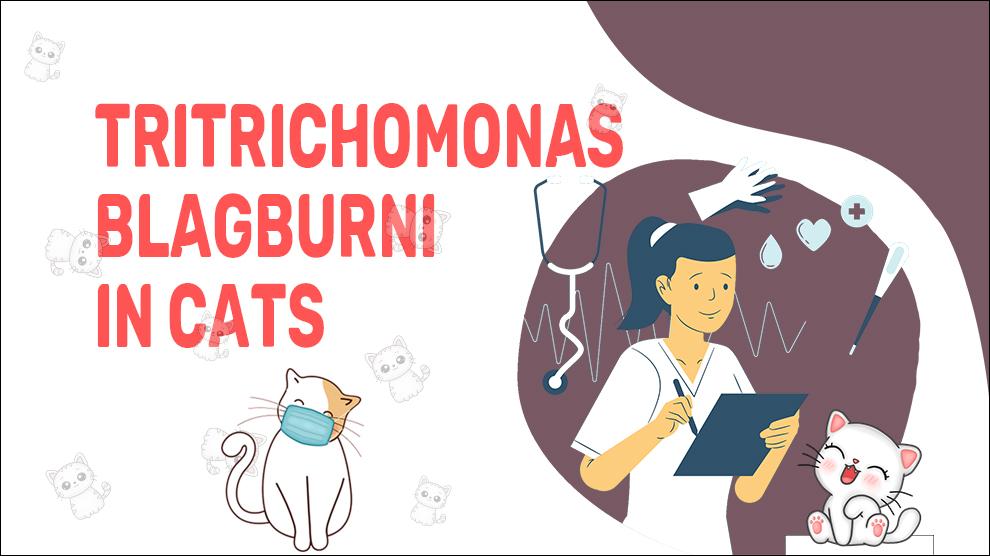What Is Tritrichomonas Blagburni In Cats?
Tritrichomonas Blagburni is a protozoan parasite that affects cats' large intestines, causing diarrhea and other gastrointestinal problems.
It was first identified in 1999 and is now considered a common cause of chronic diarrhea in cats, particularly in multi-cat households and shelters.
Clinical Signs Of Tritrichomonas Blagburni In Cats
The symptoms of Tritrichomonas Blagburni in cats include chronic diarrhea, fecal incontinence, and straining to defecate. Diarrhea may be soft, watery, and contain mucus or blood.
Fecal incontinence may cause the cat to leak stool around the house or litter box, which can lead to hygiene issues and irritation of the skin around the anus.
The straining to defecate may cause the cat to spend more time in the litter box and appear uncomfortable during the process. Cats may also experience weight loss and a decreased appetite.
- Loose Stool
- Smelly Stools
- Loss Of Skin Elasticity
- Sunken Eyes
- Pale Gums
- Redness In Anal Region
Treatment Options For Tritrichomonas Blagburni In Cats
The treatment of Tritrichomonas Blagburni in cats involves the use of certain medications, including ronidazole and metronidazole.
These drugs work by killing the parasite and reducing the symptoms of diarrhea. Treatment can last up to several weeks, and it is important to follow the veterinarian's instructions carefully.
In some cases, cats may need to be hospitalized for intravenous fluid therapy and supportive care.
Home Remedies For Tritrichomonas Blagburni In Cats
Unfortunately, there are no home remedies that can effectively treat Tritrichomonas Blagburni in cats. It is important to seek veterinary care for diagnosis and treatment.
How To Prevent Tritrichomonas Blagburni In Cats?
The prevention of Tritrichomonas Blagburni in cats involves good hygiene practices and minimizing stress in cats.
Regular cleaning of litter boxes, food and water dishes, and other surfaces can help prevent the spread of the disease.
Minimizing stress in cats can also help reduce the risk of infection, as stress can weaken the immune system and make cats more susceptible to disease.
It is also important to isolate infected cats and clean up their feces promptly to prevent transmission to other cats.
Affected Cat Breeds Of Tritrichomonas Blagburni
Tritrichomonas Blagburni is not known to affect specific breeds of cats, and any cat can be at risk of infection.
However, the disease has been reported more frequently in certain populations of cats, such as those in multi-cat environments like shelters and catteries.
Additionally, younger cats, especially those under two years of age, are at a higher risk of contracting Tritrichomonas Blagburni as they are more likely to engage in playful interactions that involve biting and scratching.
It is also more common in cats that have recently been adopted from shelters or other rescue organizations.
Causes For Tritrichomonas Blagburni In Cats
Causes:
Tritrichomonas Blagburni is a protozoan parasite that infects cats' large intestines. The transmission of the disease occurs through the ingestion of cysts, which are passed in the feces of infected cats.
The disease is more common in multi-cat households and shelters, where the close proximity of cats facilitates transmission.
Stressful situations, such as moving to a new home or undergoing a medical procedure, can also increase the likelihood of infection.
When To See A Vet For Tritrichomonas Blagburni In Cats?
If you notice any of the symptoms of Tritrichomonas Blagburni in your cat, it is important to see a veterinarian.
They can perform a fecal test to diagnose the disease and prescribe the appropriate treatment.
It is also important to seek veterinary care if your cat has severe diarrhea, is not eating, or appears lethargic or dehydrated.
Food Suggestions For Tritrichomonas Blagburni In Cats
There are no specific dietary recommendations for cats with Tritrichomonas Blagburni. However, it is always important to feed your cat a high-quality, balanced diet to maintain overall health.
Conclusion
Tritrichomonas Blagburni is a relatively newly discovered parasite that can cause chronic diarrhea in cats.
While it is not a life-threatening condition, it can greatly impact a cat's quality of life if left untreated.
It is important to seek veterinary care if you suspect your cat may have Tritrichomonas Blagburni to ensure proper diagnosis and treatment.
With proper care and treatment, cats with Tritrichomonas Blagburni can go on to live happy, healthy lives.











